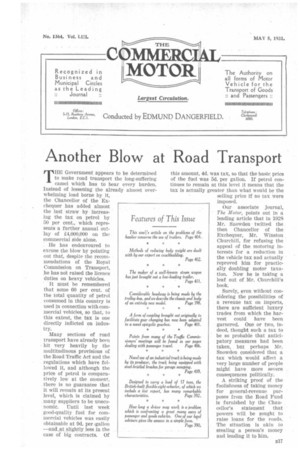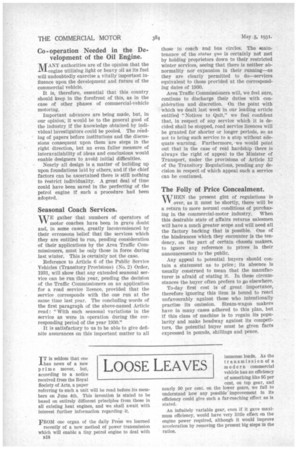Another Blow at Road Transport
Page 35

Page 36

If you've noticed an error in this article please click here to report it so we can fix it.
THE Government appears to be determined to make road transport the long-suffering camel which has to bear every burden. Instead of lessening the already almost 'overwhelming load borne by it, the Chancellor of the Ex chequer has added almost the last straw by increasing the tax on petrol by 50 per cent., which represents a further annual outlay of £4,000,000 on the commercial side alone.
• He has endeavoured to excuse the blow by pointing out that, despite the recommendations of the Royal Commission on Transport, he has not raised the licence duties on heavy vehicles.
' It must be remembered that some 60 per cent, of the total quantity of petrol consumed in this country is used in connection with commercial vehicles, so that, to this extent, the tax is one directly inflicted on industry.
Many sections of road transport have already been hit very heavily by the multitudinous provisions of the Road Traffic Act and the regulations which have followed it, and although the price of petrol is comparatively low at the moment, there is no guarantee that it will remain at its present level, which is claimed by many suppliers to be uneconomic. Until last week good-quality fuel for commercial vehicles was easily obtainable at 9d. per gallon —and., at slightly less in the case of big contracts. Of this amount, 4d. was tax, so that the basic price of the fuel was 5d. per gallon. If petrol continues to remain at this level it means that the tax is actually greater than what would be the selling price if no tax were imposed.
Our associate journal, The Motor, points out in a leading article that in 1828 Mr. Snowden twitted the then Chancellor of the Exchequer, Mr. Winston Churchill, for refusing the appeal of the motoring interests for a reduction in the vehicle tax and actually reproved him for practically doubling motor taxation. Now he is taking a leaf out of Mr. Churchill's book.
Surely, even without considering the possibilities of a revenue tax on imports, there are sufficient luxury trades from which the harvest could have been garnered. One or two, indeed, thought such a tax to be so probable that anticipatory measures had been taken, but perhaps Mr. Snowden considered that a tax which would affect a very large number of people might have more severe consequences politically.
A striking proof of the foolishness of taking money for general-revenue purposes from the Road Fund is furnished by the Chancellor's statement that powers will be sought to raise loans for the roads. The situation is akin to stealing a person's money and lending it to him.
Co-operation Needed in the Development of the Oil Engine.
Air ANY authorities are of the opinion that the .L-VI-engine utilizing light or heavy oil as its fuel will undoubtedly exercise a vitally Important influence upon the development and future of the commercial vehicle.
It is, therefore, essential that this country should keep In the forefront of this, as in the case of other phases of commercial-vehicle motoring. Important advances are being made, but, in our opinion, it would be to the general good of the industry if the knowledge obtained by individual investigators could be pooled. The reading of papers before institutions and the discussions consequent upon them are steps in the right direction, but an even fuller measure of interavailability of ideas and conclusions would enable designers to avoid initial difficulties. Nearly all design is a matter of building up upon foundations laid by others, and if the chief factors can be ascertained there is still nothing to restrict individuality. A great deal of time could have been saved in the perfecting of the petrol engine if such a procedure had been adopted.
Seasonal Coach Services.
WE gather that numbers of operators of motor coaches have been in grave doubt and, in some cases, greatly inconvenienced by their erroneous belief that the services which they are entitled to run, pending consideration of their applications by the Area Traffic Commissioners, must be only those in force during last winter. This is certainly not the case. Reference to Article 6 of the Public Service Vehicles (Transitory Provisions) (No. 2) Order, 1931, will show that any extended seasonal service can be run this year, pending the decision of the Traffic Commissioners on an application for a road service licence, provided that the service corresponds with the one run at the same time last year. The concluding words of the first paragraph of the above-named Article read: "With such seasonal variations in the service as were in operation during the corresponding period of the year 1930." It is satisfactory to us to be able to give definite assurances on this important matter to all those in coach and bus circles. The xnaintenance of the status quo is certainly not met by holding proprietors down to their restricted winter services, seeing that there is neither abnormality nor expansion in their running—as they are clearly permitted to do—services equivalent to those provided at the corresponding dates of 1930.
Area Traffic Commissioners will, we feel sure, continue to discharge their duties with consideration and discretion. On the point with which we dealt last week in our leading article entitled "Notices to Quit," we feel confident that, in respect of any service which it is decided shall be stopped, road service licences will be granted for shorter or longer periods, so as not to bring such service to a stop without adequate warning. Furthermore, we would point out that in the case of real hardship there is always the right of appeal to the Minister of Transport, under the provisions of Article 12 of the Transitory Regulations, pending any decision in respect of which appeal such a service can be continued.
The Folly of Price Concealment.
Alt THEN the present glut of regulations is v over, as it must be shortly, there will be a return to more normal conditions of purchasing in the commercial-motor industry. When this desirable state of affairs returns salesmen will have a much greater scope and will need all the factory backing that is possible. One of the hindrances which they encounter is the tendency, on the part of certain chassis makers, to ignore any reference to prices in their announcements to the public.
Any appeal to potential buyers should contain a statement as to price; its absence is usually construed to mean that the manufacturer is afraid of stating it. In these circumstances the buyer often prefers to go elsewhere. To-day first cost is of great importance, therefore ignoring this item is bound to react unfavourably against those who intentionally practise its omission. Steam-wagon makers have in many cases adhered to this plan, but If this class of machine is to regain its popularity and make headway against its competitors, the potential buyer must be given facts expressed in pounds, shillings and pence.




































































































